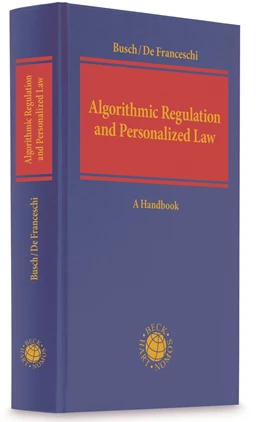Busch/De Franchschi, Algorithmic Regulation and Personalized Law, 2021, C.H.Beck

Christoph Busch / Alberto De Franceschi
Algorithmic Regulation and Personalized Law
A Handbook
Munich: C.H.Beck, 2021, Book, Hardcover, XIII, 292 S., 160,00 Euro incl. VAT
In Englisch
ISBN 978-3-406-74391-7
– In Gemeinschaft mit Nomos Verlagsgesellschaft, Baden-Baden und Hart Publishing, Oxford –
www.beck-shop.de
The handbook deals with a transatlantic controversy. It is about the use of artificial intelligence and the use of algorithms in the analysis of Big Data with regard to the protection of users‘ personal rights. This is one of the core topics of contemporary IT law. Legally, the problems that arise here are largely unresolved. At present, the focus is more on problem descriptions and the development of (inevitably hypothetical) solution models. This is exactly what this interesting book offers.
This Handbook explores the ways in which the use of big data analytics and artificial intelligence could recalibrate the relationship between law and individuality and change the foundational structures of our legal systems. In this perspective, the volume contributes to the emerging literature on „granular law“ or „personalized law“. Bringing together contributions by eminent scholars from both sides of the Atlantic, it aims to serve both as a gateway to this emerging and promising field and as a catalyst for new scholarly research. In particular, this Handbook explores the concept of personalized law, its implementation in contract, consumer and tort law, as well as the related implications for behavioral sciences, smart contracts, nondiscrimination and enforcement.
This book is organized in four parts. Part I unfolds the governing structures of personalized rights, following an introduction to the transatlantic debate. Authors from across the Atlantic are also involved here, which only makes this book more interesting. The problem touches on several legal systems, with unresolved issues of conflict of rights. U.S. law, however, plays a leading role in this book, which is hardly surprising. This part also specifically identifies any infringing acts. The second Chapter is dedicated to the relevant liability facts on the basis of Negliance in the USA with existing case groups and newly developing case groups. The third chapter deals with the failure of the currently existing regulations in the face of technical developments, as appropriate regulations have hardly been developed in this respect, with examples also being given.
The second part deals with theoretical perspectives and discusses possible solution models, as legal systems will inevitably have to respond to these challenges and change themselves in the process. Models de lege ferenda are discussed. In the the third part
The third part deals with influences and changes in the area of contract law, consumer law and tort law. Parts of these perspectives have already been reflected in a new European law of obligations for the digital age, which, however, still contains many problems of detail, not to mention breaks in construction.
The fourth part is about technical developments, as these developments replace law more and more, because they are faster than the changes in law, whereby contract law can react faster than a legislator. It is also about behaviors and the changes in legal communications, for example, involving smart contracts. The fourth chapter of this part deals with absolute core questions of future legal developments: how to set legal norms for personalized business structures? It is also about further individualizations with the simultaneous use of artificial intelligence, which can no longer be stopped.
This very interesting Book is authored by leading scholars from Canada, Germany, Italy, Israel and the United States. It contains innovative approaches and comparative perspectives. It shall drive the development of the right.
The editors
Prof. Dr. Christoph Busch, Maître en Droit is Professor of Law at the University of Osnabrück (Germany) and Visiting Fellow at the Yale Law School Information Society Project. He is cochairman of the European Law Institute’s Digital Law Group, co-editor of the Journal of European Consumer and Market Law (EuCML) and a member of the European Commission’s Expert Group to the Observatory on the Online Platform Economy. His research focuses on digital platforms and algorithmic regulation.
Prof. Dr. Alberto De Franceschi is associate professor of Private Law and Intellectual Property Rights at the University of Ferrara (Italy). He is co-chairman of the European Law Institute’s Digital Law Group, co-editor of the Journal of European Consumer and Market Law (EuCML) and of The Italian Law Journal. His research focuses on issues related to the supply of digital content and digital services, privacy regulation, online platforms and the draft of a European Business Code. He has been acting as a consultant to the Italian Ministry of Justice in the framework of the European Digital Single Market Strategy.
The target group
For Scholars, Practitioners and Policy-Makers.
